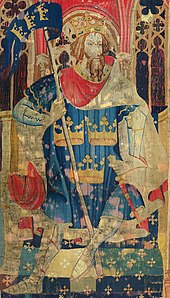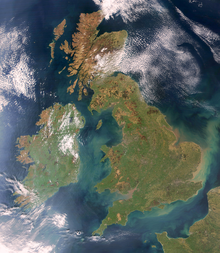| Revision as of 02:11, 29 March 2015 editMaster of Time (talk | contribs)Autopatrolled, Extended confirmed users, Pending changes reviewers, Rollbackers27,640 editsm Applying general fixes using AWB← Previous edit |
Latest revision as of 14:33, 21 August 2024 edit undo82.131.129.247 (talk) updated and extended informationTag: Visual edit |
| (169 intermediate revisions by more than 100 users not shown) |
| Line 1: |
Line 1: |
|
|
{{Short description|Political ideology and movement}} |
| ⚫ |
] of the United Kingdom, adopted in this version in 1801 bearing the England's red cross with white border (England in 1801 included Wales within it), Ireland's Saint Patrick's Saltire with a white border, and Scotland's Saint Andrew's Saltire and blue background. This is a common symbol used by British nationalists.]] |
|
|
|
{{distinguish|English nationalism}} |
|
] became the first monarch of a United Britain]] |
|
|
⚫ |
] of the United Kingdom, adopted in this version in 1801 bearing the England's red cross with white border (England in 1801 included Wales within it), Ireland's Saint Patrick's Saltire with a white border, and Scotland's Saint Andrew's Saltire and blue background. This is a common symbol used by British nationalists]] |
| ⚫ |
], the king of the ancient ], depicted as one of the ] in tapestry, c. 1385. The legend of King Arthur as a warrior ruler and British hero as depicted by ] in '']'' laid the foundation of British nationalism.]] |
|
|
] and ].]] |
|
] was the first monarch of the ]]] |
|
⚫ |
], the king of the ancient ], depicted as one of the ] in tapestry, c. 1385. The legend of King Arthur as a warrior ruler and ] hero as depicted by ] in '']'' laid the foundation of British nationalism.]] |
| ⚫ |
'''British nationalism''' asserts that the ] are a ] and promotes the cultural unity of the British,{{sfn|Motyl|2001|pp=62-63}}<ref name="Guntram H. Herb 2008">Guntram H. Herb, David H. Kaplan. Nations and Nationalism: A Global Historical Overview: A Global Historical Overview. Santa Barbara, California, USA: ABC-CLIO, 2008.</ref> in a definition of ] that includes people of ], ], ], ] and ] descent.{{sfn|Motyl|2001|pp=62-64}} British nationalism is closely associated with ], which seeks to uphold the political union that is the ], or strengthen the links between the countries of the United Kingdom.<ref name="Mil133">{{harvnb|Miller|2005|p=133}}.</ref> |
|
|
|
] and ]. Originally British nationalism was typically applicable to ]. British nationalism typically focuses on the unity of ] and ].]] |
|
⚫ |
'''British nationalism''' asserts that the ] are a ] and promotes the cultural unity of ],{{sfn|Motyl|2001|pp=62-63}}<ref name="Guntram H. Herb 2008">Guntram H. Herb, David H. Kaplan. Nations and Nationalism: A Global Historical Overview: A Global Historical Overview. Santa Barbara, California, USA: ABC-CLIO, 2008.</ref> in a definition of ] that may include people of ], ], ], and ] descent (those living in both ] and ] and historically the whole of ] when it was within the United Kingdom).{{sfn|Motyl|2001|pp=62-64}} British nationalism is closely associated with ], which seeks to uphold the political union that is the ], or strengthen the links between the countries of the United Kingdom.<ref name="Mil133">{{harvnb|Miller|2005|p=133}}.</ref> |
|
|
|
|
|
British nationalism's unifying identity descends from the ] who dwelt on the island of ].<ref name="Guntram H. Herb 2008"/> British nationalism grew to include people outside Great Britain, in ], because of the ], which declared that the crown of Ireland was to be held by the ruling monarch of ] as well as ] calls for unity with Britain.<ref>Brendan Bradshaw, Peter Roberts. British Consciousness and Identity: The Making of Britain, 1533-1707. P. 302.</ref> |
|
British nationalism's unifying identity descends from the ] who dwelt on the island of ].<ref name="Guntram H. Herb 2008"/> British nationalism grew to include people outside Great Britain, in ], because of the ], which declared that the crown of Ireland was to be held by the ruling monarch of ] as well as ] calls for unity with Britain.<ref>Brendan Bradshaw, Peter Roberts. British Consciousness and Identity: The Making of Britain, 1533-1707. P. 302.</ref> |
|
|
|
|
|
It is characterised as a "powerful but ambivalent force in British politics".<ref>{{harvnb|Smith|Smith|White|1988|p=61}}.</ref> In its moderate form, British nationalism has been a ], emphasizing both cohesion and diversity of the people of the United Kingdom, its dependencies, and its former colonies.{{sfn|Motyl|2001|pp=64}} Recently however, ] nationalism has arisen based on fear of Britain being swamped by immigrants; this anti-immigrant nativist nationalism has manifested politically in the ] and other nativist nationalist movements.{{sfn|Motyl|2001|pp=64}} Politicians, such as ] ] of the Conservative Party and his direct predecessor ] of the Labour Party, have sought to promote British nationalism as a progressive cause.<ref>http://www.theguardian.com/politics/2014/jun/25/gordon-brown-independent-scotland-no-more-equal-progressive-alex-salmond-policies</ref><ref>Conservative Party leader David Cameron advocates liberal or civic British nationalism: "Being British is one of the most successful examples of inclusive civic nationalism in the world." http://www.conservatives.com/News/Speeches/2006/09/Cameron_I_will_never_take_Scotland_for_granted.aspx www.conservatives.com Official party site (26 September 2006)</ref> |
|
It is characterised as a "powerful but ambivalent force in British politics".<ref>{{harvnb|Smith|Smith|White|1988|p=61}}.</ref> In its moderate form, British nationalism has been a ], emphasizing both cohesion and diversity of the people of the United Kingdom, its dependencies, and its former colonies.{{sfn|Motyl|2001|pp=64}} However, ] nationalism has arisen based on fears relating to immigration; this ] nativist nationalism has manifested politically in the ] and other nativist nationalist movements.{{sfn|Motyl|2001|pp=64}} Politicians, such as former ] ], have sought to promote British nationalism as a progressive cause.<ref>Conservative Party leader David Cameron advocates liberal or civic British nationalism: {{cite web |quote=Being British is one of the most successful examples of inclusive civic nationalism in the world. |title=Cameron: I will never take Scotland for granted |url=http://www.conservatives.com/News/Speeches/2006/09/Cameron_I_will_never_take_Scotland_for_granted.aspx |archive-url=https://web.archive.org/web/20120924062357/http://www.conservatives.com/News/Speeches/2006/09/Cameron_I_will_never_take_Scotland_for_granted.aspx |archive-date=24 September 2012 |website=Conservatives |date=15 September 2006}} The official party site.</ref> |
|
|
|
|
|
==Nationalism and unionism== |
|
==Nationalism and unionism== |
|
Nowadays, as in the past, unionist movements exist in ] and ]. These movements seek specifically to retain the ties between those areas and the rest of the ], in opposition to civic nationalist movements. Such unionist movements include the ], ] and the ]. In ] and ] the ], ] and ] parties support the Union. |
|
Nowadays, as in the past, unionist movements exist in ], ] and ]. These movements seek specifically to retain the ties between those areas and the rest of the ], in opposition to civic nationalist movements. Such unionist movements include the ], ] and the ]. In ] and ] the ], ], ], and ] support the Union. British nationalists are generally supportive of unionism. |
|
|
|
|
|
==List of British nationalist parties== |
|
|
* British Commonwealth Party |
|
|
* ] |
|
|
* ] |
|
|
* ] |
|
|
* ] |
|
|
* ] |
|
|
* ] |
|
|
* ] |
|
|
* ] |
|
|
* ] |
|
|
* ] |
|
|
* ] |
|
|
*] |
|
|
|
|
|
==See also== |
|
==See also== |
|
|
* ] |
|
|
* ] |
|
* ] |
|
* ] |
|
|
* ] |
|
* ] |
|
* ] |
|
* ] |
|
* ] |
|
* ] |
|
* ] |
|
* ] |
|
* ] |
|
* ] |
|
* ] |
|
* ] |
|
* ] |
|
* ] |
|
* ] |
|
* ] |
|
* ] |
|
|
* ] |
|
|
* ] |
|
|
* ] |
|
|
|
|
|
==References== |
|
==References== |
| Line 30: |
Line 53: |
|
===Bibliography=== |
|
===Bibliography=== |
|
*{{citation|title=Anglo-Scottish Relations from 1900 to Devolution and Beyond|volume=128|journal=Proceedings of the British Academy|first=William Lockley|last=Miller|publisher=Oxford University Press|year=2005|isbn=978-0-19-726331-0}} |
|
*{{citation|title=Anglo-Scottish Relations from 1900 to Devolution and Beyond|volume=128|journal=Proceedings of the British Academy|first=William Lockley|last=Miller|publisher=Oxford University Press|year=2005|isbn=978-0-19-726331-0}} |
|
*{{cite book|last=Motyl|first=Alexander J.|authorlink=Alexander J. Motyl|title=Encyclopedia of Nationalism, Volume II|year=2001|publisher=Academic Press|location=|isbn=0-12-227230-7|ref=harv}} |
|
*{{cite book|last=Motyl|first=Alexander J.|author-link=Alexander J. Motyl|title=Encyclopedia of Nationalism, Volume II|year=2001|publisher=Academic Press|isbn=0-12-227230-7}} |
|
*{{citation|title=British foreign policy: tradition, change, and transformation|first1=Michael|last1=Smith|first2=Steve|last2=Smith|first3=Brian|last3=White|publisher=Routledge|year=1988|isbn=978-0-04-327081-3}} |
|
*{{citation|title=British foreign policy: tradition, change, and transformation|first1=Michael|last1=Smith|first2=Steve|last2=Smith|first3=Brian|last3=White|publisher=Routledge|year=1988|isbn=978-0-04-327081-3}} |
|
|
|
|
|
==External links== |
|
==External links== |
|
* |
|
* |
|
* |
|
* |
|
* |
|
* |
|
{{Nationalism in the United Kingdom}} |
|
{{Nationalism in the United Kingdom}} |
It is characterised as a "powerful but ambivalent force in British politics". In its moderate form, British nationalism has been a civic nationalism, emphasizing both cohesion and diversity of the people of the United Kingdom, its dependencies, and its former colonies. However, nativist nationalism has arisen based on fears relating to immigration; this anti-immigrant nativist nationalism has manifested politically in the British National Party and other nativist nationalist movements. Politicians, such as former British prime minister David Cameron, have sought to promote British nationalism as a progressive cause.



